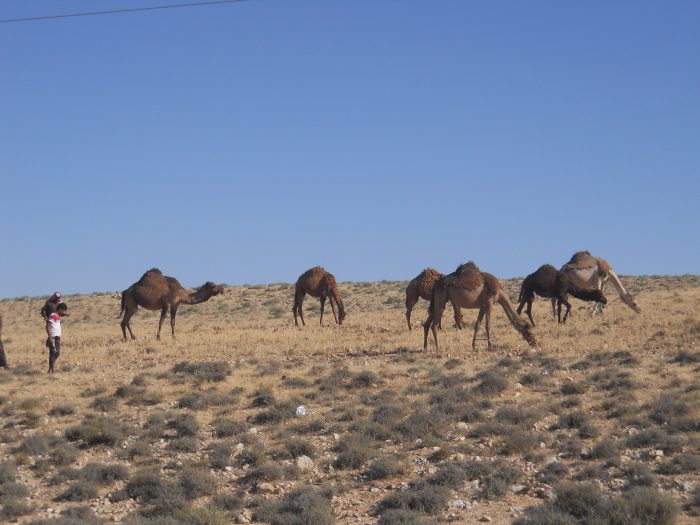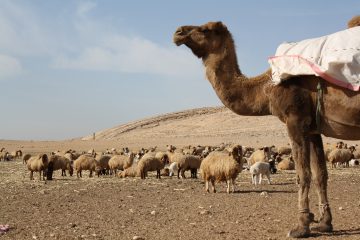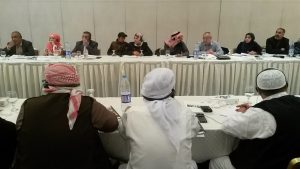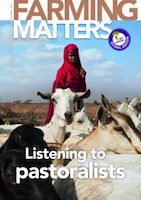The Arabian Pastoralist Communities Network emerged from one community’s struggle to assert their land rights. In the face of injustice, a local cooperative learnt that in order to participate in local decision making processes they needed to build relationships with national, regional and international organisations.

Dana is a small mountain village about 1300 metres above sea level in the south of Jordan. The place has been inhabited for more than 4000 years,and the architecture that stands today was built in the traditional Ottoman style in the 15th century. For hundreds of years, people from the Ata’ta tribe, originally pastoralists, lived there. This was the case until recently, when the people of Dana suffered two great injustices. The first occurred in the 1960s when they lost their customary land to a reforestation project, and the second when their land was turned into a nature reserve in the early 1990s. As a result, most of Dana’s families moved to the nearby ‘new’ village of Qadisiyah. The current population is about 15,000 people, all of whom either lived in Dana or are descendants of the original Dana population.
Unheard voices
Dana’s population tried to stop the reforestation project and the establishment of the reserve, but they lost both battles. They lacked sufficient information to effectively protest, and did not know about their rights. They were unable to compete against the power and influence of the reforestation department (a government department) or against the organisation managing the reserve which had influential contacts in the capital, Amman. The only compensation received from the organisation managing the nature reserve was the promise of 500 job opportunities which never materialised.
In 1994, in order to face the challenges that came with the loss of their land, some of Dana’s families organised themselves into a cooperative which is now known as the Dana and Qadisiyah Local Community Cooperative (or the Dana Cooperative). Yet they soon saw that without key contacts in Amman, they had few opportunities to influence the decisions made about their land.
This was confirmed when one of the young members discovered online that an international meeting had taken place in Dana a few years before. One of the outcomes of the meeting was the ‘Dana Declaration’, which stipulated that conservation projects consider the rights of local communities. Ironically, although the meeting took place in the village of Dana, the people of Dana had not been informed.
Instead, only those employed by the nature reserve had been invited to attend. Quite surprisingly, the meeting was held in English. None of the attending employees understood English, and the purpose and outcomes of the meeting were not explained to them. Another irony is that one of the meeting’s organisers was the organisation managing the nature reserve, but they themselves have not taken the declaration into consideration.
Building a network
Finding out about the Dana Declaration meeting was a turning point for the community and its cooperative in many ways. The members of the Dana Cooperative understood the importance of the internet and of the English language for communication outside of their community. They set up an IT and community centre in Qadisiyah which has become an important space for community members to learn computer and language skills, as well as to organise education and awareness raising programmes. Besides strengthening the community from the bottom up, the cooperative began to broaden their network.

They contacted other pastoralist and indigenous communities in similar situations, tapping into their networks and alliances, and learning about their local and international achievements. The cooperative took every opportunity to meet international and United Nations organisations to find out what these organisations were doing, and what support they were able to offer. Using these new ‘friends’, the cooperative built a robust network, part of which developed into the World Alliance of Mobile Indigenous People (WAMIP). The Dana Cooperative was one of the cofounders of this alliance which was created in Segovia, Spain in 2007. The first general meeting of the alliance included hundreds of participants.
Since then, the cooperative has participated in different international events, meetings, negotiations and consultations. For example, they have contributed to the development of the Voluntary Guidelines on the Responsible Governance of Tenure of Land, Fisheries and Forests in the Context of National Food Security (2012). The cooperative was able to discover what several international organisations were doing in other parts of Jordan, and connected with the World Initiative for Sustainable Pastoralism (WISP), and the International Union for the Conservation of Nature (IUCN).
The Arabian Pastoralist Community Network

Photo: Jorge Chavez-Tafur
At one of the meetings of the World Alliance of Mobile Indigenous People (WAMIP), the Dana Cooperative suggested that WAMIP needed to deepen its work. In order to bring about the necessary changes at a local level, the cooperative suggested that WAMIP should work first regionally, then nationally and then at a local level, and that by working in this way, WAMIP would benefit from the international environment and support available.
In December 2013 in Nairobi, WAMIP made the decision to start regional networks. At the same time, the Arab delegation attending the meeting suggested that the Arabian Pastoralist Community Network (APCN) be formed. The delegation proposed that the APCN be independent from WAMIP, but work closely with them and other international alliances for the benefit of pastoral communities.
In April 2014, with the support of IUCN’s West Asia office, the APCN held its first meeting. Representatives of pastoralist communities from different Arab countries were invited to attend and participate in the establishment of the network. The aims are to develop a large alliance powerful enough to support local pastoral communities in Jordan and in other Arab countries, and to encourage decision makers and stakeholders to support local pastoral populations. One way to do this is to give local communities control over their resources, while supporting them manage these resources in a sustainable way. This will enhance the pastoral communities’ participation in and contribution to the national economy. It will also help to protect the local ecosystems by working with those who directly benefit from and reside in these ecosystems.
Local roots
The Dana Cooperative has developed good relationships with the local branches and offices of various international and intergovernmental organisations. This has provided opportunities for local and national support, and the opportunity to link with other groups and pastoral communities. The cooperative, although a relatively small organisation, has used regional and international alliances to develop a sphere of influence and a regional network that affects positive change at the local level.
In short, this is the story of a small organisation which has used regional and international alliances to develop a sphere of influence and a regional network, and with it promote change at a local level. It has had a positive impact because, while reaching out to international organisations, the cooperative’s members have not lost sight of their community’s strengths, weaknesses, challenges and opportunities.
The journey towards empowerment has not been easy, but it has provided the opportunity to reach out to similar communities in Jordan, the Arab world and beyond. Helping to share experiences, knowledge and practical ideas, the organisation has supported other organisations to strengthen skills and knowledge and fulfil objectives that service and enhance their communities. This, in turn, contributes towards food security, and has a strong economic, social and cultural impact. There is no doubt that this experience is relevant to local communities struggling under similar circumstances.
Khalid Khawaldeh (Khalid.Khawaldeh@yahoo.com ) is the Coordinator of the Arabian Pastoralist Community Network.

